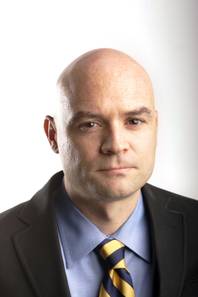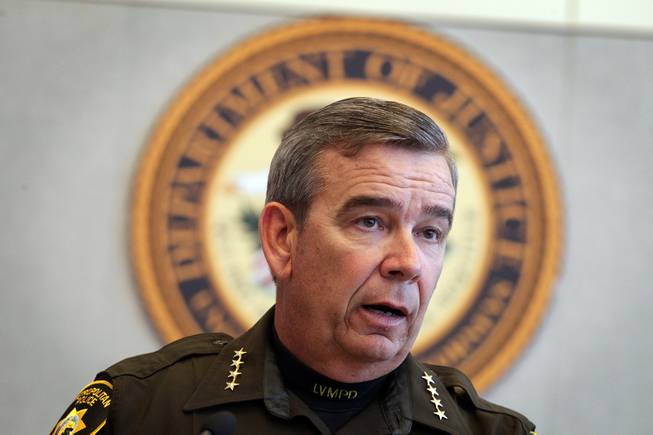Sunday, Feb. 17, 2013 | 2 a.m.

J. Patrick Coolican
I’m sure I’m not the only one concerned by the news that crime was up 9 percent last year in the area patrolled by Las Vegas Metro Police.
Crime is still down 20 percent from five years ago, so we needn’t panic, but this should get our attention. Given all the gambling and drug addiction in the valley, property crime, which was up last year, is too routine. Serious assaults, including stabbings and shootings, were also up, according to Metro Sheriff Doug Gillespie. Violent crime tends to disproportionately affect neighborhoods that face enough disadvantages already.
In an interview last month, Gillespie attributed the increase to budget cuts. In recent years, Metro has eliminated 506 positions: 238 officers, 236 civilians and 32 temporary positions.
“When you eliminate those positions and reduce investigative components, and your officer who is out on the street wearing the uniform and driving the black and white doesn’t have the downtime to be proactive and be visible, this is what happens,” he said.
Metro has asked the Legislature to approve a quarter-cent sales tax increase in Clark County, first approved by voters in 2004, to close another looming budget deficit, which would require still more reductions.
I posed some questions to Metro chief financial officer Karen Keller to help me make up my mind about the tax increase question before the Legislature.
Here are some Metro budget basics from Keller:
• The current year's budget, which ends June 30, is $502 million. Revenue will be $447 million. Keller expects revenue for next year’s budget to be flat. In other words, Metro faces what’s called a “structural deficit” -- expenses will continue to exceed revenue if something isn’t done to correct the imbalance.
• The bulk of the revenue problem comes from a steep drop in property tax revenue: $57 million, or a 31 percent reduction, reflecting how land and home values have plummeted.
• Metro has been making up the difference with money set aside in its reserves. The department had a fund balance in June of $54 million, expecting to draw the balance down to about $25 million at the end of the current fiscal year. Next year’s budget would draw down an additional $15 million. Metro will present a proposed budget for next year Feb. 25.
• The quarter-cent sales tax would raise $55 million for Metro.
I talked to a legislator who questioned how Metro spends its money, citing the mammoth downtown headquarters the department leases and the faulty radio system it purchased.
Metro leases headquarters for about $12.5 million annually. When they moved into the headquarters, they were able to move out of other buildings, which saved $4.3 million. Because Metro was using free space at the old city hall that doesn’t exist at the new City Hall, Metro would have had to lease an additional $2 million to $3 million of space without the new headquarters. So, all told, the new headquarters costs an extra $5 to $6 million per year, which is a lot, but doesn’t account for the $55 million shortfall.
With respect to the faulty radio system, Metro paid $40.1 million for it, with $11.2 million coming from grants and property seizures. All is not lost -- there are two components of the radio system, the data piece and the voice piece. They’ll keep the data piece.
The real costs are in people. Keller says salaries account for 60 percent of the total budget and benefits account for another 27 percent. In other words, labor eats up 87 percent of Metro’s budget. Contractual obligations make it difficult to reduce labor costs unless you reduce the number of officers. Are officers overpaid? I’ll leave that for another day.
Our ratio of officer to population is about 1.8 per 1,000 residents. Keller sent me the ratios for other cities: Austin, 2.0; Fresno, 1.6; Houston, 2.2; Jacksonville, 2.1; Los Angeles, 2.5; Phoenix, 2.0; San Diego, 1.4; Seattle, 2.1.
Keller estimated that within a few years, the tax increase would allow Metro to hire back the positions the department lost during the past few years.
I asked Gillespie about the increase in crime and his plan to combat it.
After a pause, he mentioned the need to look at crime trends, preventive measures, enforcement and prosecutions.
I wasn’t satisfied by the generalities in which he spoke, which he all but acknowledged when he said, “I don’t know if I’ve answered your question.”
But I’m not sure there was a better answer. It seems to me he needs officers, which means he needs this tax increase to prevent more reductions.
What’s interesting is that the opposition seems fairly muted, including from the usual “No taxes now, no taxes tomorrow and no taxes forever” crowd.
The governor has said he’ll sign it.
I suspect there’s broad consensus in favor of it because it makes sense that we have fewer officers on the street, and therefore crime is up.
You get what you pay for. A fairly simple rule in life.
So, about our schools ....


Join the Discussion:
Check this out for a full explanation of our conversion to the LiveFyre commenting system and instructions on how to sign up for an account.
Full comments policy